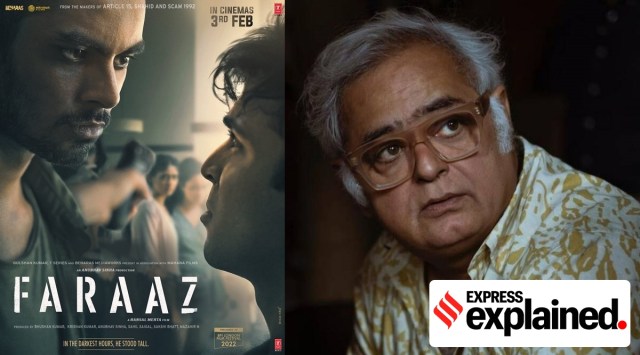Plea against ‘Faraaz’ movie in Delhi HC: What have the filmmakers, mothers of two Dhaka terror attack victims argued?
The mothers of two of the victims had argued before the single-judge bench earlier that their “right to be left alone” supersedes the right of the filmmakers to commercially exploit the 2016 Dhaka terror attack.
 Hansal Mehta's (right) Faraaz is based on the 2016 Dhaka terror attack which led to the deaths of over 20 hostages. (Photos: Faraaz Official Poster, Instagram/Hansal Mehta)
Hansal Mehta's (right) Faraaz is based on the 2016 Dhaka terror attack which led to the deaths of over 20 hostages. (Photos: Faraaz Official Poster, Instagram/Hansal Mehta) Hearing a plea to restrain the release of director Hansal Mehta’s upcoming movie Faraaz, which is based on the 2016 Dhaka terrorist attack, the Delhi High Court Tuesday asked both parties – the makers of the film and the mothers of two girls killed in the attack – to consider resolving their issues.
What is the case?
The two women, mothers of Abinta Kabir and Tarishi Jain, first approached the Delhi High Court last year seeking an interim order restraining the makers from releasing the film. Claiming a breach of their right to privacy protected under Article 21 of the Constitution, the women said the film may depict their daughters in “a bad light”, which would be difficult for them as they would have to revisit the traumatic incident all over again.
They argued that their “right to be left alone” supersedes the right of the filmmakers to commercially exploit the incident at the expense of the fundamental rights of the mothers protected under the Constitution.
What were the arguments before the single-judge bench?
Before the single-judge bench, the women claimed that several news articles have mentioned that “Faraaz stood up for the lives of his two friends”. After the attack, sources had told The Indian Express that the terrorists gave Faraaz the option of walking away, but he did not want to leave his friends behind. This had come to light during questioning of the hostages who were rescued.
The order records that the women had a reasonable apprehension that the “film has been created to show Faraaz Ayaaz Hossain as a protagonist or something of the attack, as the movie has been named after Faraaz Ayaaz Hossain”.
It was argued that if such a depiction is made, it shall be completely false as the mothers were amongst the first witnesses to meet the survivors after the attack and were well aware of the series of events, the order states. They said that glorifying or exaggerating one victim of the attack will be a gross misinterpretation of facts, the order states.
The makers of the film emphasized vehemently before the single judge that the names of the girls are not being used in the film. It was argued that a disclaimer has been put that the film is a “fictional piece of work inspired by a true incident.” The makers submitted that the family of Faraaz has already given a “No Objection” to the use of his name in the movie.
It was argued that the majority of the movie is based on the incident which happened on July 1, 2016, and there is no reference to any friendship of Faraaz with the two girls prior to the incident. “Furthermore, the characters of the two daughters have been fictionalised. The movie in no way has insensitively depicted the incident in which the two daughters of the two plaintiffs unfortunately were also involved,” the order records.
The makers had also argued that information around the incident was already in public domain as the incident was covered in great detail both in Bangladeshi and global media and has also been the subject of multiple extensive literary pieces as well as audio and video programmes.
What did the single-judge bench rule?
Ruling in favour of the makers, the single judge bench of Justice Neena Bansal Krishna, in its October 14 decision, held that the right to privacy in the case would be that of the two daughters who died in the attack. Observing that the right to privacy is not inheritable by the mothers of the girls, the court noted, “As already discussed above, Right to Privacy is essentially a right in personam and is not inheritable by the mothers/ legal heirs of the deceased persons.”
On the issue of defamation, the court was of the view that defamation is a “personal right and is not pre-emptive in nature”. The defamation essentially can be asserted only after the movie has been released, the court held. “Defamation of a deceased person does not give rise to a civil right of action and common law in favour of the surviving family or relatives who are not themselves defamed…In this context it may be observed that emotional trauma per se may be relevant as a component of defamation, but cannot be the sole basis for making a prima facie case in favour of the plaintiffs,” the court held.
The court also noted that the makers of the film had explained and assured that the names of the two girls have not been used and that the identity of the two girls was not disclosed in any form. The Court observed that the ‘right to be left alone’, is an aspect of Right to Privacy but in the given case it cannot be termed as a right to be left alone especially when the two plaintiffs get barely any mention in the entire movie. The women thereafter challenged this decision before a division bench of the HC.
What happened in the High Court?
When the matter was listed before the division bench of Justice Siddharth Mridul and Justice Talwant Singh on Tuesday, appearing for the mothers, senior advocate Akhil Sibal argued that the makers approached the issue with complete insensitivity without taking the consent of the mothers and also denied showing them the film.
Sibal said that the single judge had held that since the girls are now deceased, there can be no right to privacy in relation to their rights, which is a wrong preposition. When the bench remarked that the incident must already be in the public domain, Sibal said, “We know of the nature of the medium. They (mothers) want to be left alone and don’t want their privacy to be invaded.”
He also referred to an affidavit filed by a viewer who watched the film when it was screened in London last year and argued that the information on the girls is “thinly disguised”, as opposed to what the makers claimed before the single judge. “My only concern is that we have filed an affidavit which shows that parents are reflected, their names are thinly disguised, images of the girls are also shown which is contrary to what the single judge was told.”
The HC remarked that the “right to privacy relates to issues which take place in the confines of a home. There must be so much coverage of these incidents unfortunately. Not a single holocaust that mankind has ever experienced has not been put on celluloid.”
The bench thereafter asked the parties to sit together and try to resolve the issue. The HC further told advocate Sheyl Trehan, appearing for the makers, that the mothers viewing the movie will not “in any manner affect the outcome of the proceedings” and would rather only “alleviate their fears that their daughters are not depicted in a bad manner”. Trehan thereafter said that her clients are open to the suggestion to sit with the mothers and try to find a solution.
The movie
The film jointly produced by T-Series, and Benaras Media Works in association with Mahana Films is slated for a February 3 release. In a statement, reported by The Indian Express on January 9, Hansal Mehta said, “To me, Faraaz is a story of our polarised times. Through the one event that rocked Dhaka — the 2016 attack on the Holey Artisan cafe — I’ve tried to explore the broader theme of violence and what really drives young, vulnerable minds towards it. Designed as a nail-biting thriller that plays out over one tense night, my attempt with Faraaz has also been to shine a light on the immense courage and humanity that it takes to stand up against violence. Because standing up against bigotry and the carnage it triggers is the only way to defeat it.”
Faraaz, which had its world premiere at the BFI London Film Festival 2022, stars Zahaan Kapoor and Aditya Rawal in the lead roles.
What was the Dhaka attack?
As per eyewitness accounts, on the night of July 1, 2016, terrorists stormed the popular Holey Artisan Bakery in Dhaka’s posh Gulshan area, taking visitors hostage. As reported by The Indian Express, an 11-hour siege by terrorists, which ended on the morning of July 2, 2016, left at least 20 hostages dead out of a total of 29 lives lost.
The hostages killed included one Indian – whose mother is among the petitioners – nine Italians, seven Japanese, and one American. Two police officers and six terrorists were also killed in the operation, while one was captured. Thirteen of the hostages were rescued, including one Argentine, two Sri Lankans and two Bangladeshis.
The gunmen, initially firing blanks, ordered restaurant workers to switch off the lights, and draped black clothes over closed-circuit cameras, according to a survivor, who spoke with local TV channel ATN News at the time. He and others, including kitchen staff, managed to escape by running to the rooftop or out the back door.
As reported by The Indian Express, Faraaz Ayaaz Hossain, 20, was an alumnus of the American school in Baridharawere, Dhaka. He is the grandson of Latifur Rahman, chairman of Transcom Group, and Shahnaz Rahman, and the younger of two sons of Simeen Hossain, managing director, of Eskayef Bangladesh Limited, and Muhammad Waquer Bin Hossain. He was pursuing his undergraduate studies at Emory University in Atlanta, Georgia, US.
“He came to Dhaka on May 18, 2016 for his summer holidays. He had gone with two of his friends to Holey Artisan for dinner when terrorists attacked the place,” a family associate had told The Indian Express.
- 01
- 02
- 03
- 04
- 05






































